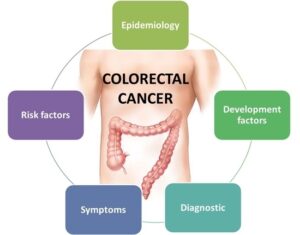Understanding Colorectal Cancer: Detection, Prevention, and Treatment
Colorectal cancer, often referred to as colon or rectal cancer, is a type of cancer that affects the colon (large intestine) or the rectum, which is the final portion of the colon. It is one of the most common forms of cancer worldwide, with a significant impact on public health. In this comprehensive guide, we will explore the essential aspects of colorectal cancer, including its causes, symptoms, detection, prevention, and treatment options.
Causes and Risk Factors:
Colorectal cancer typically develops from precancerous polyps (abnormal growths) in the colon or rectum. While the exact cause of these polyps is not always clear, several risk factors increase the likelihood of developing colorectal cancer:
- Age: The risk of colorectal cancer increases with age, with most cases occurring in individuals over 50.
- Family History: A family history of colorectal cancer or certain inherited genetic mutations can elevate the risk.
- Diet: A diet high in red meat and processed foods, and low in fiber, fruits, and vegetables, may contribute to the development of colorectal cancer.
- Physical Inactivity: Lack of regular physical activity can increase the risk of colorectal cancer.
- Smoking and Alcohol: Tobacco use and excessive alcohol consumption are associated with a higher risk.

Signs and Symptoms:
Colorectal cancer often presents with subtle or no symptoms in its early stages, which is why regular screenings are crucial. As the disease progresses, common symptoms may include:
- Persistent changes in bowel habits
- Blood in the stool or rectal bleeding
- Abdominal pain or discomfort
- Unexplained weight loss
- Fatigue
- Anemia
Detection and Diagnosis:
Early detection is key to successful treatment and improved outcomes in colorectal cancer. Several screening methods are available:
- Colonoscopy: A colonoscopy is a procedure in which a flexible tube with a camera is inserted into the colon to detect and remove polyps.
- Stool Tests: Fecal occult blood tests and fecal immunochemical tests (FIT) can detect small amounts of blood in the stool, which may indicate colorectal cancer.
- CT Colonography: Also known as virtual colonoscopy, this involves a CT scan of the colon to detect abnormalities.
- Flexible Sigmoidoscopy: Similar to a colonoscopy but examines only the lower part of the colon.
Prevention:
Reducing the risk of colorectal cancer involves adopting a healthy lifestyle and participating in regular screenings:
- Dietary Changes: Consume a diet rich in fruits, vegetables, and whole grains, while limiting red meat and processed foods.
- Regular Exercise: Engage in regular physical activity to maintain a healthy weight and overall well-being.
- Screening: Adhere to recommended screening guidelines, starting at age 45 or earlier if you have risk factors or a family history.
- Limit Alcohol and Quit Smoking: Moderation in alcohol consumption and quitting smoking can reduce the risk.
Treatment Options:
The treatment of colorectal cancer depends on its stage, location, and the patient’s overall health. Common treatment options include:
- Surgery: Surgery is the primary treatment for early-stage colorectal cancer. It involves the removal of the tumor and nearby lymph nodes.
- Chemotherapy: Chemotherapy may be used before or after surgery to shrink tumors, destroy cancer cells, or prevent their spread.
- Radiation Therapy: Radiation therapy uses high-energy beams to target and kill cancer cells. It is often used in combination with surgery or chemotherapy.
- Targeted Therapy: Targeted drugs can block specific molecules involved in cancer growth and spread.
- Immunotherapy: Immunotherapy drugs stimulate the immune system to recognize and attack cancer cells.
Frequently Asked Questions:
At what age should I start getting screened for colorectal cancer?
Ans: It is generally recommended to begin regular screenings at age 45, although individuals with risk factors or a family history may need to start earlier.
Can colorectal cancer be prevented entirely?
Ans: While prevention is not guaranteed, adopting a healthy lifestyle, including a balanced diet and regular exercise, along with screenings, can significantly reduce the risk.
Is colorectal cancer treatable in its advanced stages?
Ans: Yes, colorectal cancer can be treated in advanced stages. Treatment options may include surgery, chemotherapy, radiation therapy, targeted therapy, and immunotherapy, depending on the specific situation.
In conclusion, colorectal cancer is a prevalent but highly treatable form of cancer when detected early. Regular screenings, a healthy lifestyle, and awareness of risk factors are vital in reducing the incidence and impact of this disease. If you have concerns or fall into a high-risk category, consult with a healthcare professional to develop a personalized plan for prevention and early detection.

